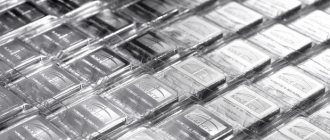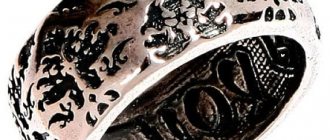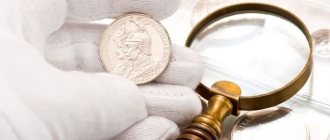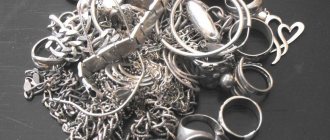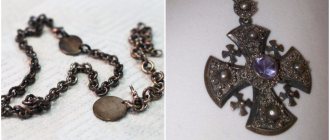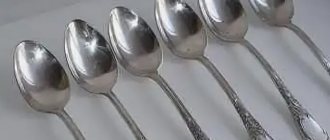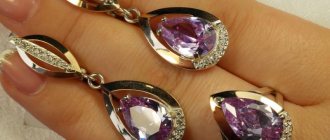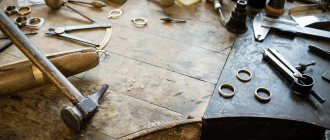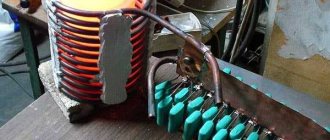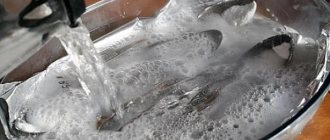Few people know that radio components contain large amounts of precious metals such as silver, platinum, gold and palladium. Not only the internal and external parts of the structure are coated with silver, but also the solid bodies of the mechanisms so that they do not succumb to corrosion. Parts such as contacts are not just coated with precious metals, but are made from them. In order to extract silver, nitric, as well as sulfuric or hydrochloric acid is often used, which will react with ferric chloride.
Use of silver in electronics. Technical silver in the USSR
Silver conducts electricity and heat better than other metals. It is inert to water, air, and some gases. It is used in a wide variety of industries, the list of which is constantly expanding.
The precious metal is used to create jewelry, in the production of contacts for various electrical products, for minting coins, as a means of investment, in the production of mirrors, clothing, batteries, in the chemical industry, and photography. The volumes of lunar metal attributable to the industrial sector exceed 70% of global production.
Silver alloy wire
During the Soviet era, they did not skimp on silver in the production of radio components. The metal used in this area is called technical. This is a special alloy containing copper, nickel, tin, aluminum, cadmium as impurities. The number of additives is not large, usually does not exceed 0.2% of the total composition. The bulk of it is pure silver.
The exception is magnetic and non-magnetic samples of technical precious metals. Here the silver content varies from 60 to 80%.
If jewelry metal performs a decorative function, then technical metal must provide electrical conductivity and reflection of light.
What is refining
Typically, the concept of “refining” means obtaining a metal of high purity through a series of procedures to remove impurities. This process is carried out in several stages, at each of which certain physical and chemical methods are used to separate interfering substances. Precious metals are often purified in this way.
The raw materials for refining in this case can be jewelry scrap, “silver foam”, sludge after electrical purification of the relevant substances and spot gold.
List of silver-containing components in electronics
The main sources of silver recyclables for refining are radio and electrical devices. In addition to lunar metal, devices can contain gold, palladium, tantalum, and platinum.
Soviet microcircuits
The largest amount of silver plating is found on microcircuits manufactured before 1990.
If we compare these Soviet parts with others, they are quite promising for refining. The most lunar metal per 1000 units of microcircuits contains:
- 1200ЦЛ2 - about 120 grams;
- 1200TSL1 - about 114 grams;
- 1200M1 - about 90 grams;
- K57ZRF41/42 - about 70 grams;
Technical silver
Electronic machine capacitors
Capacitors can be found inside computing devices, tube televisions, tape recorders, and telephone exchanges.
A significant amount of precious metal per 1000 units of parts contain:
- ETO-4 600*10 - 14163.6999 grams;
- ETO-4 - 8345.16 grams;
- ETO-3 400*2 - 2450 grams;
- ETO-3 - 1655.07 grams;
The cost of one capacitor varies from 50 to 5000 rubles.
Radio resistors
The most valued are variable resistors whose copper terminals are treated with high-grade silver.
The prevailing amount of precious metal per 1000 units contains:
- UN-100 – 207 grams;
- UNU50 – 132 grams;
- UN 25 – 67 grams;
Resistors are among the most widely used elements in electronics.
Domestic and imported connectors
Connecting elements are used to temporarily connect electrical conductors using mechanical contact.
Imported connectors are less preferable for refining, since they are three times inferior in precious metal content to Soviet ones.
A lot of lunar metal can be obtained from connectors: RG1N-2–31 RG90–5 (socket) RMG-39B45Sh2A1 RG1N-2–23 RG1N-2–29.
Transistors
A transistor is a radio-electronic component made of semiconductor material used to amplify, generate, switch, and convert an electrical signal.
Grandma's tips
In jewelry, metal is not used in its original, pure form (the same applies to the production of cutlery). Other components are added to the alloy, which give additional strength. The classic option here is copper. To distinguish real silver from a fake, you need to talk not about Ag as such, but about the percentage of its content in the alloy.
of people living today were able to determine the purity of metal without any drugs or devices
- Argentum is very thermally conductive - it heats up quickly and cools down quickly. If you hold it in your fist, it will immediately acquire body temperature. You can put it in boiling water (if the decoration does not have stones) and then pick it up. Real metal will burn, but not for long.
- The product can be rubbed in your palms for several minutes. If the skin remains clean, the alloy is good; if dark traces remain, there are excess impurities (most often zinc).
- Silver ringing is not just a stable phrase. When gently tapped, the jewelry rattles; the argentum vibrates lightly and protractedly. The percussion instrument should be something akin to a knitting needle.
- If you place a spoon made of Ag in the sun, it will brightly reflect the rays and shine. A cheap alloy will give a dull glow, or even a barely noticeable one.
- People with a keen sense of smell (and good experience) distinguished silver by smell. They assured that pure metal smelled of freshness and lily of the valley. Now this method is hardly suitable for everyone - modern perfumery will make even iron smell like roses.
- Argentum has a high density. Even a small product made from it should be felt in your hand. And today it is so easy to distinguish silver from much lighter aluminum.
- Previously, the ring was covered with crumbs of rye bread and left there for two days. If the jewelry noticeably turned black during this time, this was a good sign - the alloy was considered to be of high quality. With today's bread this test may not pass.
- You can try to bend the spoon (plate). An object made of normal argentum will yield quite easily and will have almost no spring. But this method will not give a 100% guarantee: you can also bend a steel device. And it will be difficult to return the item to its original appearance.
All these tests were based on knowledge of the properties of Ag. Knowledgeable people could determine the authenticity of the metal by its appearance. This is probably still available to experienced jewelers.
Source
Chemical properties of technical silver
The very concept of “technical silver” is used for secondary precious metal obtained by processing equipment, and for material used in technology.
The properties of lunar metal that have contributed to its widespread use are plasticity, high reflectivity, and increased chemical resistance. The metal does not react with oxygen, hydrogen, nitrogen, carbon, or silicon.
Technical silver melts at temperatures from 780 to 962 °C, boils at 2210 °C.
Chlorine refining
The method is based on the assumption that silver and base metals react faster than gold and the platinum family of elements in a chlorine atmosphere. This makes it possible to separate the latter substances from the substance being purified (in refining technology, the most labor-intensive process is the separation of noble alloys).
The molten rough gold is passed through chlorine gas. The interaction begins with non-noble impurity elements, then silver passes into the form of the compound, which can subsequently be isolated by other refining methods. Chlorides in the mixture float to the surface due to the lower density of salts compared to metals.
Section question - answer
How to get pure silver from silver contacts?
Expert opinion
Andrey Seleznev
Chemist-technologist, Volgograd
The most preferred method for cleaning contacts is electrolytic refining. It is with its help that you can obtain precious metals of the highest purity. The choice of cleaning method directly depends on the amount of silver recyclables, its condition, and the availability of the necessary equipment.
How to remove silver from starter contacts?
Expert opinion
Zavorotniy Alexey
Service engineer
Nitric acid treatment is most preferable for starters and automatic machines. Technical parts are immersed in dilute acid; the process of dissolving the precious metal can take more than 12 hours. Next, the lunar metal is replaced with copper. This stage lasts up to three days.
How to remove silver from contacts at home?
Expert opinion
Andrey Seleznev
Chemist-technologist, Volgograd
First, the silver contact parts are crushed and treated with nitric acid. Using sodium salt, the solution is cleared of the possible presence of lead, which will become a precipitate. Next, the essence is evaporated to a dry residue, fused with a gas burner, and dissolved again. The work is repeated until pure metal is obtained.
How to separate silver from copper on contacts?
Expert opinion
Zavorotniy Alexey
Service engineer
First, the scrap silver is dissolved using nitric acid. The resulting precipitate must be evaporated to dry material, then fused. The resulting ingot must be dissolved in hydrochloric acid so that the remaining elements precipitate. The residue is removed by filtration, calcined, and dissolved again. The procedure is carried out repeatedly.
Treatment with nitric acid and copper
For this process, you need to mix 8% acid with distilled water in a 1:1 ratio. The amount of this solution is prepared at the rate of 1 liter per 50 g of silver. Next, silver is dissolved in this liquid. After the silver is completely dissolved, copper is added to the solution in the form of copper tubes to obtain the so-called “silver cement”.
This process is that copper, reacting, collects silver on its surface. This will be the “silver cement”, which must be periodically shaken off the tubes so that the reaction does not slow down. Once the reaction is complete, the silver cement will settle at the bottom. Next, all that remains is to filter the solution through coffee filters and evaporate the filtered substance, after which the dry silver powder is fused using a gas burner.
Sales of production
Do not forget that activities for processing scrap and waste of precious metals are subject to licensing in accordance with the legislation of the Russian Federation.
Individual entrepreneurs and legal entities have the right to buy and process the remains of precious metals if they have a certificate from the Assay Office.
If you try to sell metal that you yourself obtained from radio components to buyers, you should find out about criminal liability for illegal mining and sales.
Violations are regulated by Article 15.44 of the Code of Administrative Offenses, which states: the amount of the fine will be one or one and a half times the cost of the materials that are the subject of the offense.
Cost of various samples
The cost of any sample depends on the price of pure precious metal established by the Central Bank of the Russian Federation. To determine the current cost of the sample, you need to multiply the current price of the highest alloy by the required coefficient.
Current sample costs for 2022:
| Try | Cost per gram, rub. |
| 999 | 37 |
| 960 | 35,5 |
| 925 | 34 |
| 875 | 32 |
| 830 | 30 |
Silver from radio components usually has 999, 960, 875 standards.
Sales points
Buyers should be looked for on thematic forums and websites, among private advertisements. Pawn shops and purchases accept such metal several times cheaper than its real value.
If there is no license permitting the extraction of precious metal from recycled materials, you can try to make simple jewelry yourself from the resulting silver.
Cupellation
Cupellation is used in the refining of low-grade alloys. This method does not allow the separation of platinum and gold; silver is mined from alloys with lead. This method uses a special marl-lined oven with a cup-shaped crucible.
The method is based on the ability of lead in an alloy with silver to oxidize in air and separate from the metal along with impurities. Marl is a porous limestone clay that absorbs lead oxide. During the cupellation process, lead oxide evaporates under the influence of air flow. Refining is considered complete when the alloy surface has a rainbow color. When this type of paint cracks, you can see the bright shine of the silver metal.
Rules of care
You need to keep an eye on the silver contacts. Care involves periodically checking their condition. If they are dirty, you should clean them with a suede or cloth cloth . It will need to be moistened a little in gasoline. Can be cleaned with a stiff hair brush.
Peculiarities
Contacts of electrical components may contain pure silver. There are several types of connections.
- Those that are not magnetic . The silver content in this group is the highest.
- Magnetizable . They contain the least amount of pure metals.
- Copper . Soldering is a copper plate that is coated with a small layer of silver.
Silver contacts are used in low power devices. Pure metal can be extracted from:
- electromagnetic starters;
- electric machines;
- relay;
- temperature sensors;
- silver-zinc batteries.
Safety precautions
To ensure that silver refining does not cause various problems and injuries, it is necessary to follow a few simple precautions. With their help, you can avoid simple mistakes that will lead to unpleasant consequences.
Basic safety rules:
- The refining process can only be carried out in a well-ventilated area. The ideal option would be to perform the work in an open area. This will help dissolve various chemical compounds without harm to health.
- When preparing the solution, you should take into account the fact that it is forbidden to add water to acid (sulfuric, hydrochloric, nitric and others).
- During work, the respiratory system should be protected from the negative effects of harmful chemical compounds. To do this, it is recommended to use a respirator or a homemade gauze bandage.
- It is prohibited to refining silver without safety glasses. Neglecting this rule can lead to the ingress of various chemicals that will cause severe eye burns and serious vision problems.
- All work with chemicals should be carried out only with special gloves. They will protect your hands from accidental contact with acid and other chemicals.
Silver refining is a difficult process that requires certain knowledge and skills. If the work is carried out correctly and all safety measures are followed, you can avoid any problems and successfully complete the job you started.
Recommendations
Since work is carried out with aggressive chemicals, it is necessary to strictly follow the safety rules:
- be sure to ensure good ventilation of the room (it is better to work outdoors);
- use skin and mucous membrane protection: gloves, goggles, masks or gauze bandages;
- add only acid to water, never the other way around.
- check for the presence of a chemical reagent by dropping the shavings using tweezers. If it does not dissolve, add HCl to remove zinc from the deposited metal.
You can make good money by purifying silver and refining it. The profit in this business will be many times greater than the costs.
